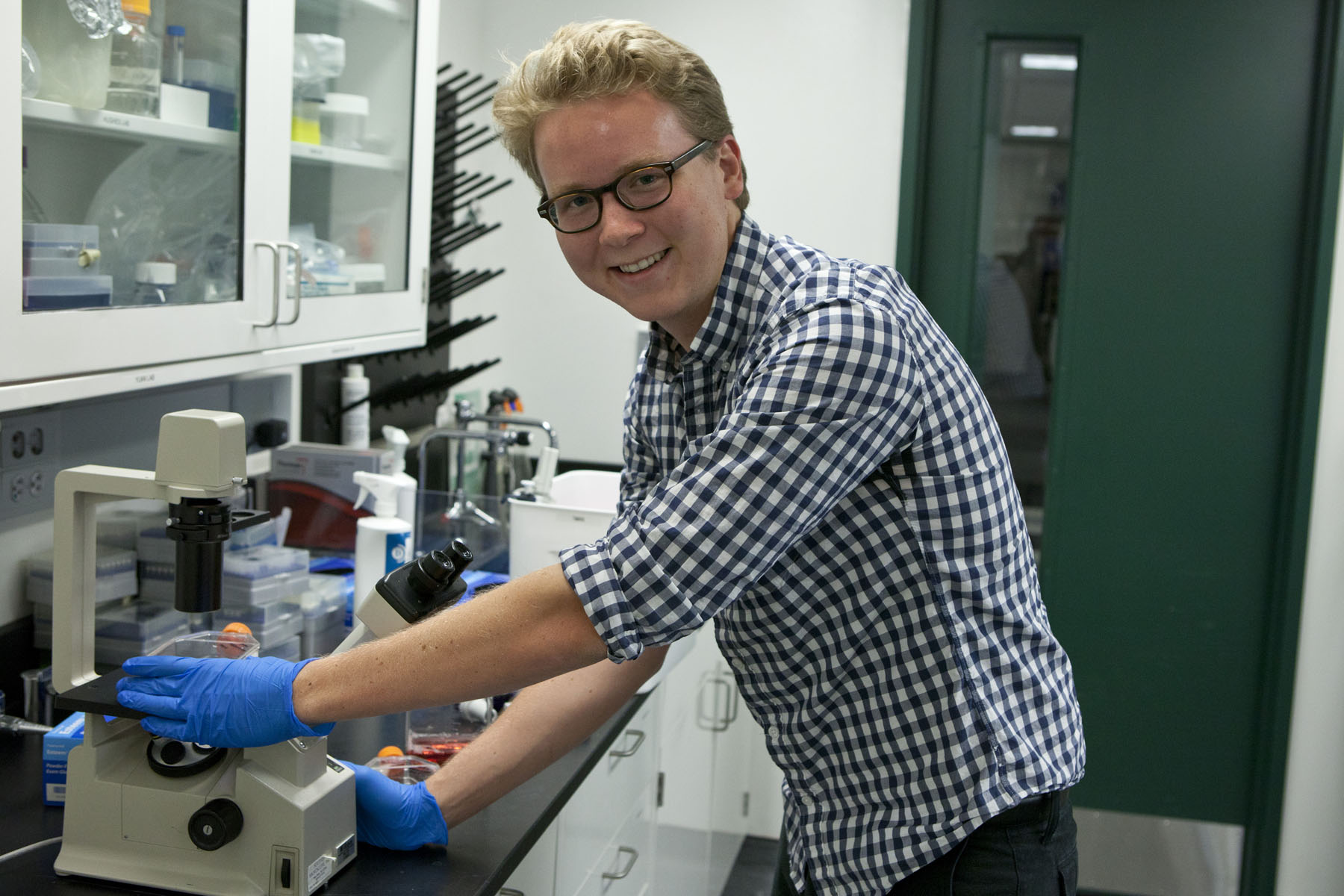Hans Verkerke's history of researching and publishing about amebiasis, an intestinal infection that often affects children in developing countries, predates even his enrollment at the University of Virginia.
Now a rising fourth-year biology student in U.Va.'s College of Arts & Sciences, Verkerke began working in the lab of Dr. William Petri while still a student at Western Albemarle High School in nearby Crozet. He'd met Petri, a professor in the School of Medicine, through lifeguarding at a neighborhood pool.
"I discovered that Dr. Petri was an eminent researcher here at U.Va. and I asked if I could start working in his lab," Verkerke said.
In the lab, he became part of the team helping Petri research amebiasis. Verkerke’s experience in the lab, where he’s been a part of several scholarly publications, underscores the benefits of undergraduate, for-credit research projects at the University. Students get hands-on experience, while researchers receive valuable contributions to their work.
"Here in biology, students like Hans incorporate their research experiences into their major requirements, often in their first year," said Douglas Taylor, who chairs the biology department. "We have more than 150 students enrolled in undergraduate research each semester. Those students go on to career as scientists, but also go on to careers in the health care, law or business, equipped with an in-depth understanding, and often a record of publication, in the life sciences."
As part of an agreement with the School of Medicine, undergraduate biology students are able to engage in for-credit research projects with medical school professors. In the spring semester, 197 biology students were conducting for-credit research with mentors from the department or the medical school.
Verkerke took a year off between high school and U.Va., and four months of that was spent in Bangladesh, where – at Petri's suggestion – he helped study amebiasis in people. The disease is caused by the Entamoeba parasite, and results in a form of dysentery that is particularly devastating to children in developing countries.
While there, Verkerke helped with a study showing that a mutation of a hormone receptor for leptin – a molecule in the bloodstream that signals the brain when you are ready to stop eating – is associated with susceptibility to amebiasis. Much of his resulting work in Petri's lab has centered on exploring that link.
"We're trying to understand the biochemistry behind this mutation," Verkerke said.
Petri said Verkerke's experience studying the disease both in the field and in laboratory conditions has set an example that other students in the lab have followed. It's also given him an opportunity to be credited in several published studies.
"He's published two papers as a middle author and published a first-author review paper," Petri said. "Hans is working on what will be his fourth publication, and it's all on the subject of diarrheal diseases in children in the developing world – specifically to try and understand what malnutrition has to do with the increased susceptibility to diseases."
In the lab, Verkerke has been part of a research team that includes other undergraduates, as well as graduate students, post-doctoral students and faculty members. The lab experience offers something the classroom on its own does not, he said.
"Working toward a goal, working with the sum total of scientific knowledge and trying to discover something new with that information is really rewarding," he said. "The lecture context doesn't lend itself to that."
Dr. Chelsea Marie, a post-doctoral fellow who is Verkerke's lab supervisor, has been working with him since the first day she joined the lab.
"I can't say enough about all the undergrads I've worked with at U.Va. – and Hans in particular –being absolutely stellar," she said. "I think it's vital that we have undergrads involved in research projects if we want to have scientists of the future."
Marie said the experience of participating in a research project as an undergraduate is often a formative one for budding scientists, and said she can trace her own career back to her experiences as an undergraduate researcher.
Petri agreed. "I think that some of the universal qualities of our undergraduates that Hans represents so well are a commitment to scholarship, exemplified by his now four-year commitment to his research project, a fascination with biology and understanding how things work – starting from studying children with amebiasis in Bangladesh to studying the impact of a single amino acid mutation in the leptin receptor makes children susceptible – and a drive and ambition to succeed," he said.
Verkerke said he may explore joint Ph.D.-M.D. programs after graduation, and that he's grateful for the research opportunities he's had at U.Va.
"It's easy to forget that he is an undergraduate student, or that he was a high school student when he began doing this work," Petri said. "He's treated like a post-doctoral fellow in the lab and is a source of advice for other people."
– by Rob Seal
Media Contact
Article Information
August 8, 2012
/content/his-research-school-medicine-enriches-undergraduates-biology-studies

